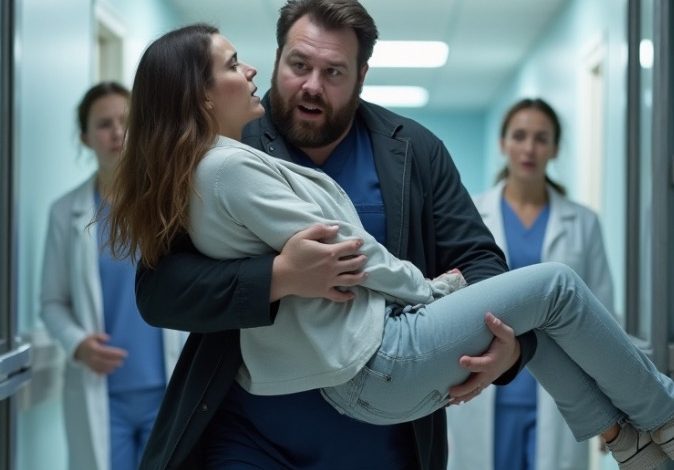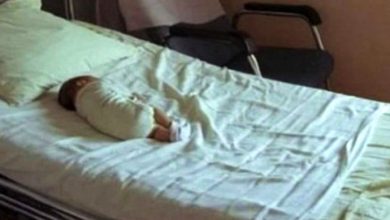“He Claimed I ‘Fell Down the Stairs.’ Then the Doctor Checked My File—And Everything Changed Forever”

For years, my husband treated me in ways no one should ever have to endure. He was charming to others, but behind closed doors, his kindness turned into cruelty. His voice could be calm one second and thunderous the next. I learned to read the air in our house—to sense when the storm was coming. I thought if I just loved him harder, he would stop.
But love doesn’t heal people who don’t want to change.
One afternoon, my body gave out. I remember a sharp pain in my ribs, the world spinning, then total darkness. The next thing I knew, I was in his arms, the cold air of a hospital rushing over me. His shirt was splattered with my blood, and his voice boomed through the halls.
“She slipped on the stairs!” he shouted. “Please—help her!”
He sounded desperate, terrified. To everyone watching, he looked like a husband trying to save his wife. But to me—to the woman lying limp in his arms—it was just another performance.
The automatic doors of Grady Memorial Hospital slid open with a hiss. Inside, nurses and doctors froze for a second as the man stomped through, carrying me like a prop in his twisted story. His name was Kofi Jide Okoro, and even in chaos, he made sure to control the narrative.
The triage nurse, Ms. Davis, met him halfway. She was used to emergencies, but something in this scene felt wrong. My head rested against his chest, but I didn’t cling to him. My eyes didn’t search for help—they hid from it.
“I found her at the bottom of the stairs,” Kofi said quickly, panting. “She hits her head sometimes. She’s clumsy, you know.”
The nurse nodded but said nothing. She had seen enough “accidents” to recognize the kind that weren’t.
Moments later, Dr. Imani Jones emerged from the OR, her scrubs stained from a long surgery. She walked toward the commotion, scanning the situation with the quiet sharpness of someone who’d seen too much truth behind too many lies.
“Let’s take her to Trauma One,” she ordered. “CT scan, X-rays, full blood panel—now.”
When Kofi tried to follow, a nurse named Eli Cole blocked him gently. “Sorry, sir, you’ll need to wait here. Hospital policy.”
“But she’s my wife!” Kofi barked.
“Exactly,” Eli replied softly. “And right now, she needs space.”
For the first time, I dared to lift my head and meet Eli’s eyes. It lasted only a heartbeat, but he understood everything I couldn’t say aloud.
Inside the trauma bay, the fluorescent lights hummed quietly. Dr. Jones examined me in silence, her hands moving with practiced precision. Beneath the professional calm, anger brewed. She catalogued every wound: fractured ribs, a broken arm, burns shaped like circles, scars across my back that spoke of a belt’s kiss, and an old jaw fracture that had healed wrong.
She finally whispered to Eli, “This didn’t happen today. This has been happening for years.”
Eli clenched his jaw. “Yeah,” he said quietly. “I know.”
When he cleaned the cut near my eye, his voice softened. “Does it hurt much?”
“Not as much as before,” I whispered.
Outside, Kofi was pacing like a trapped animal. He pretended to call family members, his voice loud enough for everyone to hear: “I’m so worried. She’s always hurting herself…” But his eyes gave him away. They weren’t worried—they were calculating.
Dr. Jones walked out to meet him, her tone even. “She’ll be under observation for several hours. Some injuries concern us.”
“Can I see her?” he demanded.
“Not yet,” she replied firmly. “She needs rest.”
As she turned away, she signaled discreetly to Tasha Williams, the hospital’s social worker. Tasha nodded, already understanding what needed to be done.
Inside the room, she sat by my bed. “Zola,” she said softly, “you’re safe here. No one can hurt you.”
I stared at the ceiling, unable to speak. When she said the word shelter, a single tear slid from my eye.
“You don’t have to decide anything today,” Tasha continued. “But there is a way out. You deserve more than this.”
Eli stood at the doorway, watching. That silent tear told him more than any medical chart ever could.
Late that night, when the hospital was quiet, Kofi tried to sneak into my room. He moved like a shadow, his hoodie pulled over his head. But Eli had been waiting.
“You can’t go in there,” he said, stepping in his path.
“I’m seeing my wife,” Kofi hissed.
“You’re not authorized. Step back.”
Two security guards appeared behind Eli, followed by Assistant District Attorney Keisha Grant, holding a folder.
“Kofi Jide Okoro,” she said clearly, “there is an active restraining order against you. Please come with us.”
His face twisted. “You don’t know who I am! She needs me! She’s sick!”
No one listened. The sound of handcuffs clicked, echoing down the sterile hallway.
Inside, I opened my eyes for the first time in hours. Eli entered quietly. “He’s gone,” he said gently. “He’s not coming back.”
For the first time in years, I exhaled without fear.
The next morning, sunlight streamed through the blinds. Eli brought breakfast and smiled. “Did you rest?”
“I think so,” I said faintly. “It felt… different.”
“The important thing,” he said, “is that you’re here—and he’s not.”
Tasha arrived soon after, sitting at the end of my bed. “When you’re ready,” she said, “we can talk.”
I hesitated, then started to speak. “The first time he hit me, he said it was an accident. He cried, said he loved me, that he’d never do it again. I believed him. Then he started checking my phone, telling me who I could talk to. He deleted my social media. He said friends would ‘poison’ me against him. I stopped calling my sister. I stopped being me.”
Tasha listened without interrupting.
“I stayed,” I whispered. “Even when he screamed, even when he locked me in the house, even when I couldn’t recognize myself in the mirror. I thought I was the problem. But now I know… if I stay, I won’t survive.”
Tasha squeezed my hand. “That’s the bravest thing you could say.”
Meanwhile, Keisha Grant was preparing the case. She knew Kofi had influence—money, charm, and arrogance. “If he gets bail,” she told her team, “Zola’s life will be in danger.” She filed for pretrial detention immediately.
Later that day, my sister Nia arrived. We hadn’t spoken in two years. She rushed into the room, her face pale. For a second, I didn’t know whether to cry or smile. Then I just opened my arms.
“I’m sorry I disappeared,” I whispered.
“I’m sorry I didn’t come sooner,” she said, hugging me tightly.
For the first time in forever, I felt seen.
Two days later, I was discharged. I left in a wheelchair, escorted by police and Tasha. Outside, a discreet vehicle waited—it belonged to the women’s shelter. Inside were reinforced windows, warm blankets, and people who understood.
That’s where I met Aliyah, a sixteen-year-old who rarely spoke. She had escaped her abusive stepfather months earlier.
One night, we sat near the window. Aliyah turned to me. “You thought it was your fault too, didn’t you?”
“Yes,” I admitted. “Sometimes, I still do.”
“Me too,” she said quietly. “But not anymore.”
Those words stayed with me.
Weeks passed. Kofi sent two letters from jail—one pretending to be loving, the other full of threats. It was clear someone was leaking information. Keisha launched an internal investigation while the shelter tightened security. Fear crept back, but this time, I wasn’t powerless.
“I’m not scared anymore,” I told Tasha. “Just angry. Angry enough to fight.”
“Then tell your story,” Tasha said. “Every detail, before a judge.”
It terrified me—but I agreed.
In court, the room was cold and packed. Cameras flashed. Kofi sat in his suit, still pretending to be the victim.
I took the stand, hands shaking but voice clear. “He isolated me from everyone. He made me believe I couldn’t live without him. The first time he hit me, he apologized. The second time, he said I deserved it. The third time, I stopped counting.”
I paused, then added, “When I got to the hospital, and someone finally looked at me like I was a person—not a problem—I realized I wanted to live.”
Keisha presented the evidence—photos, medical reports, his letters, testimony from Dr. Jones and Eli. Then she called one final witness.
“We’d like to hear from Aliyah.”
The young girl stepped forward, trembling but strong. “I didn’t know Zola before,” she said softly. “But I met her at the shelter. I wanted to give up, but she made me believe I could survive. She saved me.”
Kofi exploded from his seat. “This is lies! She’s mine!”
Two officers restrained him. The judge slammed her gavel. “Mr. Okoro, one more outburst and you’ll be removed.”
By the end of the day, justice finally caught up.
“This court finds the defendant, Kofi Jide Okoro, guilty of domestic abuse, aggravated assault, and criminal threats,” the judge declared. “He is sentenced to eight years in prison with no parole and a permanent restraining order.”
Kofi’s voice faded as he was led away.
Outside the courthouse, I didn’t speak to reporters. I simply took Nia’s hand and walked into the light.
A few weeks later, Tasha visited me with an offer. “We’d like you to join us as a peer counselor,” she said. “The women here need someone who truly understands.”
I said yes.
I moved in with Nia in a small apartment in Atlanta. We painted the walls yellow and filled the place with plants. I cut my hair short for the first time in years—Kofi had always demanded it be long. Watching each strand fall felt like reclaiming pieces of myself.
At the shelter, I led group meetings. “I don’t have magic words,” I told them. “But living with fear isn’t living. Healing doesn’t mean forgetting—it means learning how to exist without apologizing for surviving.”
On the last night of the month, I hosted a dinner. Around my small table sat Nia, Tasha, Eli, Dr. Jones, and Aliyah. We laughed, we ate gumbo and lemon pie, and for once, the air wasn’t heavy.
My father raised a glass. “To my daughter,” he said, “who found herself again.”
That night, before bed, I wrote in my journal:
I didn’t just heal—I rebuilt myself. And maybe that’s what true healing is: not waiting for the pain to vanish, but learning to live beyond it, one step at a time.










